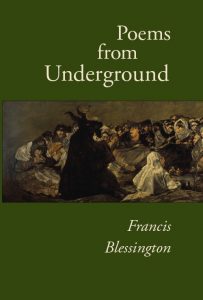Poems from Underground
Poems from Underground
by Francis Blessington
ISBN: 978-0-9975051-9-1
79 pages; 6 x 9; $16.95
Available here
Francis Blessington’s new book of poetry is an inspiring collection of great imagination. Blessington places the ancient side by side with the contemporary, capturing moments that are gone but live on, reflections and refractions of a visual space that seems endless while being held in a moment’s time. Almost every poem lives visually, as an ukiyo-e print sustains the fleeting floating world of solitary events, then anchors the reader with wood, stone, and flesh.
He has had two other books of poetry published, Wolf Howl, and Lantskip, has published numerous articles, literary criticism, a novel, poetry in many journals, received a poetry award: First Place, Der-Hovanessian Prize for Translation (2011), and two honorable mentions from The Robert Penn Warren Poetry Competition.
Poems from Underground is an outstanding collection, well deserving a place on any adequate shelf of contemporary poetry. T he whole book gives pleasure and stimulation. Francis Blessington brings fresh insight to every subject he touches, with a rare mastery of imagery and metaphor. Great art can inspire him (Goya’s Prints), but so can the sordid (Cockfight). His control of free verse forms is admirable, as well as his handling of traditional meter and rhyme, so well displayed in his memorable translations from Baudelaire and Mistral.
—X. J. Kennedy
Francis Blessington looks hard at life and catches its drift, whether in a “sun-punctured stream” or in “lariats of heat.” Compressed, physical, wounded: it’s an art of acerbic compassion: “I drink cold green tea and read bad destinies.” An art that records hard labor in fields and carries the imagination back to the planet’s birth in cooling gases: his short lines scan an immensely long line of sight.
—Rosanna Warren
Each of these poems is a palimpsest, imprinted over the Greek, Roman, Irish and Japanese pasts, bringing what is dead or erased to life in our modern times, as all successful art does.
—Greg Delanty
T he poems in this powerful and beautiful book are exhibits in a museum of what men and other creatures have done to one another and will do again, as Gun Show and Mine Exhibit and Alcatraz and Cockfight and T he Warehouses, T he Salt Mines of Wieliczka. And Dionysos is in the museum too, in Blessington’s great poem by that name: “T he ivy snaked his mask: /a smile hung up to ask / nothing—mere dark behind, / while hate and love entwined / to spur his chorus line.” T he versification is impressive throughout, sometimes in metered lines like these, more often in explorative and impacted free verse lines. T he writing is vividly descriptive and charged with emotion which at the same time has an impersonal gravity and authority.
—David Ferry

